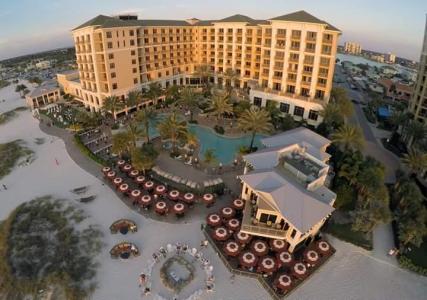In 2007, the City of Clearwater leased out land to the Sandpearl luxury resort so that it could build a marina for its well-heeled guests. However, the city doesn’t own the submerged land it leased out – the State of Florida owns it. The issue only arose after Duke Energy sought an easement across the land in question in 2014.
The city was informed by the Florida Department of Environmental Protection (DEP) in July of 2015 that the city does not own the land below the marina (and therefore cannot lease it out). Since that time, the city has not disputed the state’s finding. The city also has not formally communicated the finding of ownership to the Sandpearl Resort, nor has the city terminated the lease it has with it.
As with most unsettling tales of government corruption, it all began with a development agreement. In 2005 the 90-year old Clearwater Beach Hotel was torn down, a hotel described by the St. Petersburg Times as “another casualty in the quest for things bigger and newer.” The “bigger and newer” was the 150-foot high Sandpearl Resort, with 253 hotel rooms and 105 condos.
In January of 2005, Clearwater entered into a development agreement with the developers of the Sandpearl Resort on Mandalay Avenue in Clearwater Beach.
In September 2007, the agreement was amended: the city now agreed to lease out submerged land so that Sandpearl could build a marina
This marina was be located just across Mandalay Avenue, a short walk from the resort, and very convenient for the favored few.
The marina’s location is in a cove, described as a “boat basin” in the marina agreement, just north of the Belle Harbor Condos. After transforming a cove into a boat basin by simply speaking it into existence, St. Petersburg developer J. Michael Cheezem’s company JMC was selected as the developer for both the Sandpearl, and the nearby Belle Harbor.
The marina was built and both the intracoastal waters and the legal waters were calm at that time.
In July 2015, the city received a letter from DEP stating that the land the marina was built on “remains state-owned land”. The letter was a correction to a DEP letter in April of that same year, addressed to Duke Energy, which said that the land belonged to the city. Through a public records request, the Guardian sought to find out what the city had done in response to the July letter.
“I have had zero communications with DEP or Sandpearl Resort in regards to this property,” said Jim Benwell, the city’s Real Estate Services Coordinator. “I came into this position in February of 2016 and have had no correspondence regarding this.”
In a blistering e-mail to city council members in April, Clearwater Beach resident Bill Blackwood accused Duke Energy of “requesting the furtive falsification of my titled real property record” from the Property Appraiser’s Office. Blackwood contends that when their 2014 effort failed, Duke Energy “doubled down and contacted DEP” in 2015, resulting in the April letter.
Blackwood’s attorneys at the Johnson Pope law firm then provided additional records to DEP, and DEP reversed itself in July, 2015. That second determination remains in effect.
“The DEP’s determination is very interesting, and I think it’s sound,” said Chris McLaughlin, a surveyor and the president of MacSurvey. “We were contracted by Duke Energy. Our efforts were simply aimed at determining who to request an easement from in order to run a new power line 40 feet below Mandalay Channel.”
“We were writing a sovereign submerged land easement,” said McLaughlin. “Duke Energy didn’t try to influence our work, we have professional standards that we must adhere to.”
After the July DEP letter rejecting the city’s claim of ownership of the submerged land, Duke Energy found a way to run the new power line without requesting any easements. The new route involved a greater expense than the original route, but that calculation doesn’t include the cost of an easement.
Blackwood’s company recently received an Army Corps of Engineers (ACoE) permit to build a private mooring field just north and east of Sandpearl’s marina. Our earlier article reported on this mooring field, and how the city lost to Blackwood in court battle over submerged land in Mandalay channel. The city has appealed that ruling.
With the issuance of the ACoE permit, the city has now lost all three times it has tried to put a stop to the mooring field. The additional news now that it leased out land that it doesn’t own, and has taken no official action since learning about two years ago, that should end career(s) of top city officials. But it likely won’t.
Why has the city neither challenged DEP’s decision nor ended the lease with the Sandpearl in the last two years ago? It’s hard to know, because the city isn’t talking.
We asked Clearwater city manager Bill Horne which city employee bears responsibility for insuring that the city owns land it leases out. We asked for any comments the city might have. Horne responded “we will review and advise” and copied deputy city manager Jill Silverboard on his response to us. Despite a follow-up e-mail to Horne and Silverboard six days later, the Guardian had not received a response by the time of publication of this article.
The Guardian compiled information for this article through public records request and also documents provided to us by multiple parties. None of those parties wanted it to be known that they had provided us with the documents. Citizens can always contact us and provide us information anonymously.
Amanda Coffey in the Pinellas County Attorney’s office told us in an e-mail that “the Property Appraiser does request from the municipalities each year copies of any leases executed on municipal property.” Yet when we requested the city’s Sandpearl marina land lease agreement, an attorney in the Property Appraiser’s office said they had “no records responsive” to our request. It thus appears that the Property Appraiser requested a copy of the lease, but the city didn’t provide it to them.
Because there is no evidence that the Sandpearl has leased the state-owned land beneath its marina, the Guardian notified DEP inspector general Candie Fuller of its findings. Fuller replied that her office “will review and follow up with DEP.”
If a private citizen had unlawfully leased out state-owned it did not own, and then dragged their feet when notified by the sate, what heft fine or prosecution would have resulted?
As always….the Guardian reports and the readers decide. Please like our Facebook page to find out when we publish new stories.




